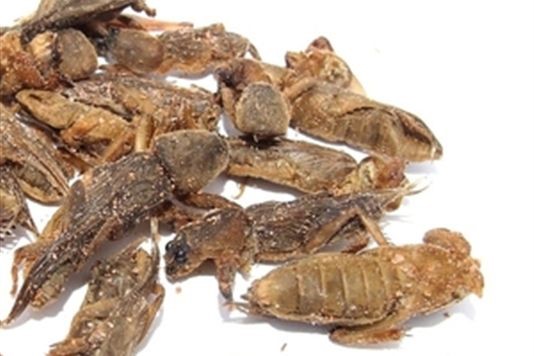Watch out for this disgusting new culinary trend!

Would you eat an insect if it was served up to you in a posh restaurant?
In the culinary world, fads often come and go. Some food obsessions, like peanut butter and jelly sandwiches, make it through prejudice and succeed in sticking around. Others, like candy sticks or dip dab sherbets, often find themselves relegated to the back of the shop shelf.
New Trends
But Britain, I hear, is about to be overwhelmed by a completely new culinary trend. Though whether one goes as far as accepting it as a ‘fad’ is, well, still to be seen.
For professors at Holland’s Wageningen University have come forward to claim that by 2020, our menus will be awash with insects – and by that I don’t mean finding the odd creepy crawly that has flown in through a restaurant’s window.
I’m talking about real insects - as in dishes that include or whose centre pieces are among others, scorpions, crickets, worms, spiders, termites and beetles. Stomach-turning, isn’t it?
Insects as food
Entomophagy – the eating of insects as food – is not, of course, an entirely new concept. For many centuries, insect species have made up part of the healthy, subsistence diet of people living in the tropics.
A mopane worm for an African tribesman, for example, is as much a mainstay for him, just as our morning toast is for us. It’s undoubtedly an economical, healthy and convenient food – and importantly, they’ve rarely known much different. (Apparently, it tastes like “seasoned cardboard with a hint of timber”, so it’s often served up in a sauce.)
In parts of Asia, insects are part of the everyday diet, too. But the worms, crickets, etc, don’t just stay among the natives, for it’s not uncommon to see tray upon tray of fried beetles and cicadas on display at busy fish and meat markets. In fact, the novelty factor of these filled crunchy, curry-powdered ‘grub snack buckets’, is the reason so many tourists enjoy roaming the food stalls in countries such as Thailand and Vietnam.
Stocked insects in Britain
In the West, however, the consumption of dried, dead insects remains still part of a niche market. In fact, there really is only Edible, a company which offers its customers vast ranges of insects, varying from toasted weaver ants to bamboo worms, which appears to cater to the dead-insect-eating market.
Edible, however, has a growing clientele, made only bigger by the fact that its produce is now stocked at Selfridges – a platform which has done wonders for the small brand.
In terms of restaurants, it is really only London's Archipelago, a locale renowned for its quirky menu, which dares to takes the phrase ‘exotic food’ to new levels. For its original offerings of crocodile bites and chocolate scorpions make it one of very few restaurants who serve customers what some would call, at the very least, 'unusual food'.
Is it successful? Interestingly, yes. Tables are booked every night and ‘Archipelago’ has in itself become the capital's by-word for ‘let’s eat something strange tonight.'
A healthy alternative?
But I remain unconvinced.
Of course, I am happily won over by the fact that insects are a plentiful source of protein, as well as being reassuringly low in cholesterol.
I’m also glad to note that unlike a cow or lamb carcass, there is very little waste post insect consumption, which in turn, makes for fewer carbon emissions.
What’s more, insects have often been seen as a potential alleviator to the world’s growing problem of food shortage. They are of course cold-blooded species, and need, in comparison to a chicken, let’s say, very little feed to prep them for our subsequent enjoyment.
The professors may well believe that the West is fast catching onto the idea of having beetle soup and ant crumble as mainstay menu options, but I struggle at shaking the inevitable grimace from my face.
Barbecued grasshoppers and oven-baked spider? Toffee scorpions and chocolate-covered dragonflies? Comfortable as I am to see these ‘delicacies' attempted and listed on menus of a minority group of restaurants, seeing their eventual replacement – for this is what the professors are suggesting – of bruschetta and garlic bread, is a little too hard to fathom. Or stomach, for that matter.
Promotion
Professor Marcel Dicke, who has overseen most of this recent research on entomophagy, is also running a four year Holland-based program dedicated to the promotion of insect-eating. He believes that by 2020, our prejudices over the insect food market will have irrevocably changed.
I, however, hope they have not. It’s hard enough finding a dead fly in one’s soup, that sitting at a restaurant table in anticipation of a crispy-fried cricket is for me, a step too far. But maybe I’m wrong. What do you feel about it?
Also worth your attention:
Is Taste of London a massive rip-off?
KFC stops targeting finger-licking fatties
Comments
Be the first to comment
Do you want to comment on this article? You need to be signed in for this feature